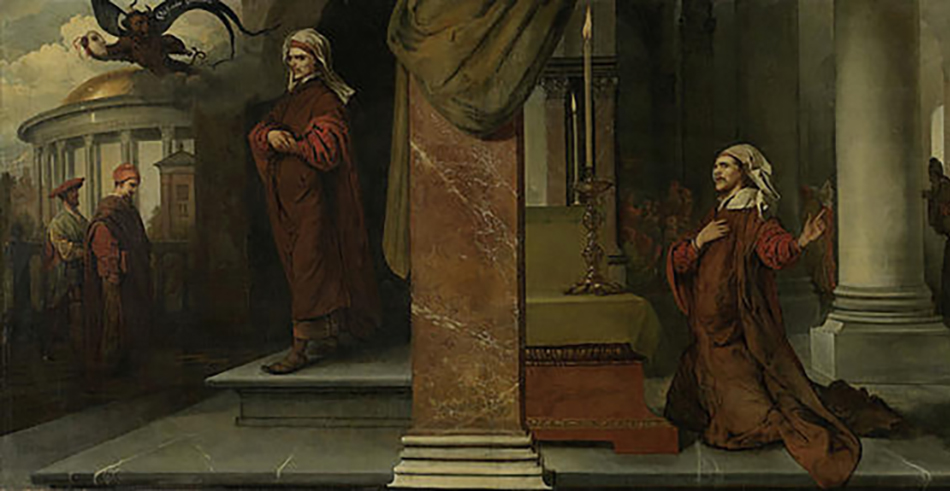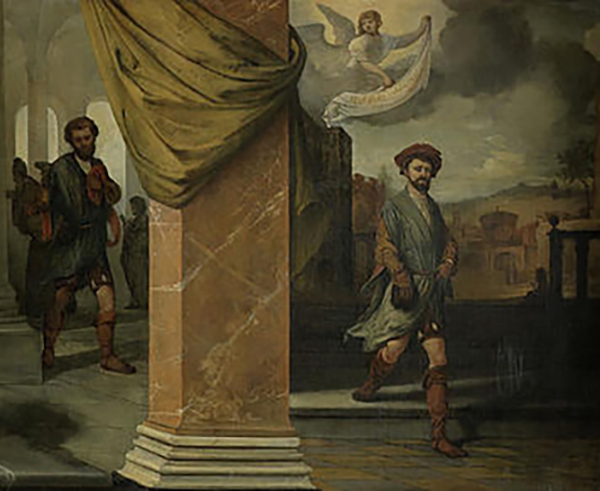Within the Gospels, Christ’s preferred way of speaking to the crowds is through parables. This literary device, these simple stories, use everyday realities to image eternal truths.According to the Ignatius Catholic Study Bible, our Lord uses parables for two purposes: (1) to invite the humble to reach behind the images and lay hold to God’s truth; (2) to obstruct the proud and conceal divine mysteries from the unworthy. Parables, therefore, both reveal and conceal divine mysteries – concealed from the proud and closed minded; revealed to the humble and docile of heart.
Among my favourite parables of Christ is that of the Pharisee and the Tax Collector (Luke 18:9-14):
He also told this parable to some who trusted in themselves that they were righteous and despised others: “Two men went up into the temple to pray, one a Pharisee and the other a tax collector. The Pharisee stood and prayed thus with himself, ‘God, I thank thee that I am not like other men, extortioners, unjust, adulterers, or even like this tax collector. I fast twice a week, I give tithes of all that I get.’ But the tax collector, standing far off, would not even lift up his eyes to heaven, but beat his breast, saying, ‘God, be merciful to me a sinner!’ I tell you, this man went down to his house justified rather than the other; for every one who exalts himself will be humbled, but he who humbles himself will be exalted.”

Before we consider the question of what truth, what divine mystery, is being revealed or concealed in the parable, we need to look closer at the principal characters involved. The Pharisee was part of a movement of Jewish renewal at the time. Finding themselves oppressed by foreign rule, the Pharisees urged a program of separation from the gentile world through ritual and religious observance. In particular that looked to the cult of the Jerusalem temple, scrupulously enforced the symbols unique to Israel’s identity (e.g., circumcision, the Sabbath, food laws, tithing), and developed a tradition of interpretive and supplementary laws and rituals which stood alongside the Mosaic Law. On account of their religious zeal and authority, the Pharisees were highly respected in Jewish society.

Tax Collectors, by comparison, were much maligned. Their role was to extort taxes from their fellow Israelites on behalf of their Roman oppressors. There were thus deemed collaborators with the foreign occupiers and traitors against Israel’s hope of national independence. For that reason the Pharisees despised tax collectors as public sinners, since they not only associated with Gentiles, but collected taxes on their behalf, and often extorted more than was required for personal gain.
With this comparison of the relative merits of Pharisee and Tax collector before us, the question of “what makes a man justified before God” is put before us. Christ intentionally ‘obstructs’ the presiding opinion of looking at reputation or external deeds, and ‘invites’ us to consider the perspective of relationship with God. The parable thus offers us two ways of being in relation. There is the way of the Pharisee who makes a list of his good works, thanking God that he is not like others. And there is the way of the tax collector, who dares not even raise his eyes to heaven, but, beating his breast, invokes the Lord’s mercy. One, we are told, goes home again at rights with God; the other does not.
So, what is the difference? Why is the prayer of the tax collector acceptable to God and that of the Pharisee not? In the first place, it must be acknowledged that the gospel is not intended as a commentary on the value of good works. There is no doubting that the Pharisee performs good works. He is conscious of his duty to fast and pay his tithes, and fulfils them laudably. Nor, for that matter, does the parable intend to turn a blind eye to the unjust practices of the tax collector. It is not dismissive of his sins. Rather, the parable is directed at those who pride themselves on being virtuous and despise everyone else. It thus concerns interior attitudes, not external deeds.

In this, the attitude of the Pharisee is flawed in two essential ways. First, in boasting of his achievements, he presumes that his actions justify him before God. Such presumption is always a danger in the spiritual life, for it tends to make us the arbitrators of our own salvation. It is a type of spiritual pride that manifests as self-righteousness. It denies our dependence on divine grace. Such self-righteousness risks becoming self-satisfaction; of not perceiving the ongoing need to perfect oneself.
In this context, St. Cyril of Alexandria, (in his commentary on St. Luke’s gospel), give this salutary warning:
“What profit is there in fasting twice in the week, if your so doing serve only as a pretext for ignorance and vanity, and make you supercilious and haughty, and selfish? You tithe your possessions, and make a boast thereof: but you in another way provoke God’s anger, by condemning men generally on this account, and accusing others; and you are yourself puffed up, though not crowned by the divine decree for righteousness, but heap, on the contrary, praises upon yourself.”
The self-assured person is thus often blind to the possibility of falling. Sin seems irrelevant to him. Confident in his sufficiency, he fails to recognise that it is only through God’s grace that he is sustained from lapses into sin. He perceives heaven as a right flowing from good works. He presumes that adherence to external forms of piety is an automatic guarantee of divine blessing. He is blind to the reality that justification/heaven is a privilege and a grace that comes to us as pure gift. He therefore forgets his need of divine mercy, being sufficient in himself.
The second way in which the Pharisee’s approach to God is flawed is in comparing himself to others. In his prayer he thanks God that he is not like the adulterous and the unjust, nor like the penny-pinching tax collector who is before him. If we’re honest, we will recognise that this is something that we are all prone to. We too compare. We too judge. We note the faults of others, even delight in their sins, so as to make ourselves feel righteous; we pull others down so as to exalt ourselves. But in truth, this attitude of comparing ourselves to others is not conducive to true righteousness, but tends towards self-righteousness.
Again, St. Cyril of Alexandria warns that there is no merit in comparing oneself to sinners.
“This shameless Pharisee praises and extols himself because he is better than extortioners, and the unjust, and adulterers. But how did it escape your notice, that a man’s being better than the bad does not necessarily and of course prove him to be worthy of admiration: but that to vie with those who habitually excel, is a noble and honourable thing, and admits a man into the number of those who are justly praised.”
Thus, to be truly righteous, we need another standard – a truly objective standard – by which we judge ourselves. Not looking sideways in comparison to others – (this is the fundamental danger of a spirituality that is predominantly horizontal – that focuses too much on the ‘community’ or of how we relate to others – an attitude that too often disintegrates into jealousy and faction) – but looking upwards, to see ourselves as God sees us. For, as Saint Francis of Assisi is want to remind us, ‘what a man is before God, that he is and nothing more’. We are not judged/justified in relation to others, but only in relation to God revealed as love, especially in the humanity of Jesus Christ.
The Tax Collector lives in this reality. Before God, heknows his sinfulness and understands his need of God’s mercy. Accordingly, he offers his prayer of humility and dependence, not daring even to raise his eyes to heaven. He stands afar off, not even venturing to raise his eyes to heaven. As St. Cyril notes:
“You see him abstaining from all boldness of speech, as having no right thereto, and smitten by the reproaches of conscience: for he was afraid of being even seen by God, as one who had been careless of His laws, and had led an unchaste and dissolute life.”
He recognises his weakness; he knows his sin. But he also trusts in God’s mercy. He knows that God’s love is not a threat to his freedom, but is the air in which he lives and breathes. He goes home at rights with God because he lives in right relationship with Him – a relationship of humble acknowledgement of who he is before God.
The Tax Collector therefore gives evidence to a most effective antidote against self-righteousness – that being the confession of one’s sinfulness. Frequent confession through the Sacrament of Penance, which presumes a thorough examination of conscience, leads one to greater self-knowledge. Through regular confession, we humbly acknowledge our imperfection. Our particular weaknesses are more clearly discerned, and we open them up to God’s healing grace. Regular confession saves us from the presumption of being alright with God. It corrects the attitude of spiritual neglect and tepidity (lukewarmness) that is so damaging to the spiritual life. Frequent confession fosters the desire to grow in virtue – to not be content with where we are at; to recognise our vocation to ever greater holiness.

The parable of the Pharisee and the Tax Collector highlights the fundamental attitude that is necessary in order to be right before God: the attitude of humility; of acknowledging the priority of our relationship with God; of realizing that we can do nothing good without Him.
I give the final words to St. Cyril who writes:
“The foolish Pharisee stood there bold and broad, lifting up his eyes without scruple, bearing witness of himself, and boastful. But the other feels shame at his conduct: he is afraid of his Judge, he smites upon his breast, he confesses his offences, he shows his malady as to the Physician, he prays that he may have mercy. And what is the result? Let us hear what the Judge says, ‘This man, He says, went down to his house justified rather than the other.’”

